Hair Transplant cost in Thailand varies between THB 71300 to 267375 (USD 2000 to 7500) approx.
Hair Transplant surgery in Thailand is one of the most sought-after treatments in the context of medical tourism. It has about 5-6% share in the medical tourism industry of Thailand. Innovative technologies, high success rate, low cost, experienced surgeons and trained para-medical staff has played an important role in registering hair transplant surgery in Thailand on the world map.
| City | Minimum Cost (USD) | Minimum Cost (THB) | Maximum Cost (USD) | Maximum Cost (THB) |
|---|---|---|---|---|
| Bangkok | USD 2000 | 71300 | USD 7500 | 267375 |
| Country | Minimum Cost | Minimum Local Currency | Maximum Cost | Maximum Local Currency |
|---|---|---|---|---|
| India | USD 1500 | INR 124725 | USD 2500 | INR 207875 |
| Thailand | USD 2000 | THB 71300 | USD 7500 | THB 267375 |
| Turkey | USD 2500 | TRY 75350 | USD 7500 | TRY 226050 |
| United Arab Emirates | USD 1300 | AED 4771 | USD 8500 | AED 31195 |
Treatment cost
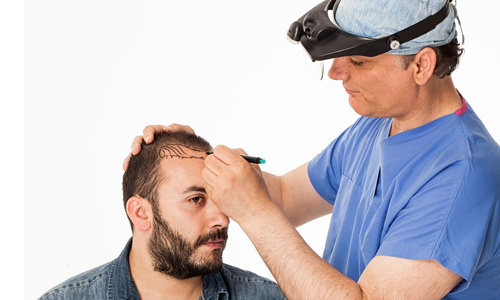
Some of the key inclusions which we provide as additional benefits of the package are:
We provide packages at economical prices with a number of additional benefits which make it a better opportunity than spending actual hospital costs with singular benefits. Hair transplant is for removal of hair follicles from one place in our body to the part which is growing bald. The sites are known as donor and recipient sites respectively. It is traditionally used as a treatment for baldness in men in areas of their head which are thinning or balding., Our comprehensive package by Asia Cosmetic Hospital in Thailand brings the best solutions for anyone wishing to get this procedure done.

We provide numerous services for your medical journey, including:
With us, you are sure to receive all the benefits at competitive prices which is a better choice than paying actual hospital costs. Hair transplant is for removal of hair follicles from one place in our body to the part which is growing bald. The sites are known as donor and recipient sites respectively. It is traditionally used as a treatment for baldness in men in areas of their head which are thinning or balding., Our comprehensive package by Fortis Hospital, Shalimar Bagh in India brings the best solutions for anyone wishing to get this procedure done.
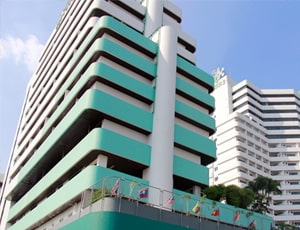
Types of Hair Transplant in Phyathai 2 International Hospital and its associated cost
| Treatment Option | Approximate Cost Range (USD) | Approximate Cost Range (THB) |
|---|---|---|
| Hair Transplant Surgery (Overall) | 5562 - 7973 | 200595 - 281483 |
| Follicular Unit Transplantation | 5502 - 7441 | 198227 - 255292 |
| Follicular Unit Extraction | 6082 - 7823 | 213513 - 284718 |
DOCTORS IN 11 SPECIALITIES
FACILITIES & AMENITIES

Types of Hair Transplant in Bangkok Plastic Surgery Clinic and its associated cost
| Treatment Option | Approximate Cost Range (USD) | Approximate Cost Range (THB) |
|---|---|---|
| Hair Transplant Surgery (Overall) | 5682 - 8050 | 203417 - 282744 |
| Follicular Unit Transplantation | 5565 - 7258 | 198900 - 264111 |
| Follicular Unit Extraction | 6193 - 7896 | 214903 - 283236 |
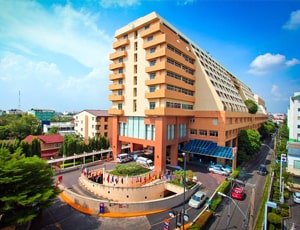
Types of Hair Transplant in Vejthani Hospital and its associated cost
| Treatment Option | Approximate Cost Range (USD) | Approximate Cost Range (THB) |
|---|---|---|
| Hair Transplant Surgery (Overall) | 5561 - 7906 | 199067 - 275463 |
| Follicular Unit Transplantation | 5552 - 7353 | 200239 - 259001 |
| Follicular Unit Extraction | 5999 - 8024 | 212188 - 279902 |
DOCTORS IN 13 SPECIALITIES
FACILITIES & AMENITIES

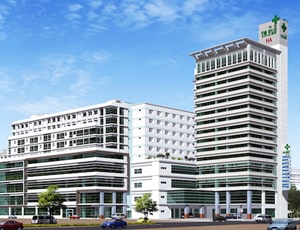
Types of Hair Transplant in Yanhee International Hospital and its associated cost
| Treatment Option | Approximate Cost Range (USD) | Approximate Cost Range (THB) |
|---|---|---|
| Hair Transplant Surgery (Overall) | 5605 - 8032 | 201962 - 284514 |
| Follicular Unit Transplantation | 5506 - 7203 | 196882 - 265137 |
| Follicular Unit Extraction | 6064 - 7789 | 219291 - 275983 |
DOCTORS IN 8 SPECIALITIES
FACILITIES & AMENITIES
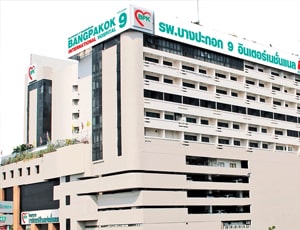
Types of Hair Transplant in Bangpakok 9 International Hospital and its associated cost
| Treatment Option | Approximate Cost Range (USD) | Approximate Cost Range (THB) |
|---|---|---|
| Hair Transplant Surgery (Overall) | 5690 - 8050 | 197595 - 283220 |
| Follicular Unit Transplantation | 5622 - 7380 | 201374 - 261921 |
| Follicular Unit Extraction | 6172 - 7886 | 215839 - 275498 |
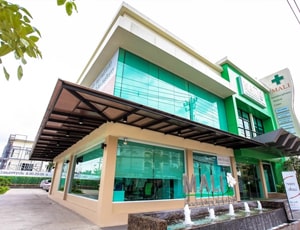
Types of Hair Transplant in MALI Interdisciplinary Hospital and its associated cost
| Treatment Option | Approximate Cost Range (USD) | Approximate Cost Range (THB) |
|---|---|---|
| Hair Transplant Surgery (Overall) | 5073 - 7113 | 180202 - 254100 |
| Follicular Unit Transplantation | 5090 - 6626 | 180319 - 236357 |
| Follicular Unit Extraction | 5476 - 7133 | 195746 - 253244 |
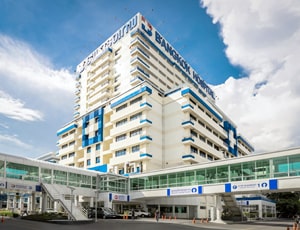
Types of Hair Transplant in Bangkok Hospital and its associated cost
| Treatment Option | Approximate Cost Range (USD) | Approximate Cost Range (THB) |
|---|---|---|
| Hair Transplant Surgery (Overall) | 5603 - 7870 | 202540 - 274980 |
| Follicular Unit Transplantation | 5507 - 7154 | 198921 - 262843 |
| Follicular Unit Extraction | 6169 - 7851 | 220195 - 278435 |
DOCTORS IN 13 SPECIALITIES
FACILITIES & AMENITIES
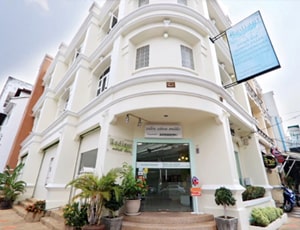
Types of Hair Transplant in Radiance Skin Clinic and its associated cost
| Treatment Option | Approximate Cost Range (USD) | Approximate Cost Range (THB) |
|---|---|---|
| Hair Transplant Surgery (Overall) | 5098 - 7077 | 180648 - 254139 |
| Follicular Unit Transplantation | 5058 - 6568 | 180320 - 236076 |
| Follicular Unit Extraction | 5460 - 7097 | 195808 - 252926 |

Types of Hair Transplant in HE Clinic and its associated cost
| Treatment Option | Approximate Cost Range (USD) | Approximate Cost Range (THB) |
|---|---|---|
| Hair Transplant Surgery (Overall) | 5067 - 7129 | 180670 - 253571 |
| Follicular Unit Transplantation | 5087 - 6610 | 181228 - 235414 |
| Follicular Unit Extraction | 5479 - 7115 | 195652 - 253422 |
DOCTORS IN 1 SPECIALITIES
FACILITIES & AMENITIES
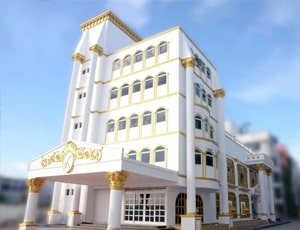
Types of Hair Transplant in Asia Cosmetic Hospital and its associated cost
| Treatment Option | Approximate Cost Range (USD) | Approximate Cost Range (THB) |
|---|---|---|
| Hair Transplant Surgery (Overall) | 5056 - 7071 | 181427 - 252345 |
| Follicular Unit Transplantation | 5088 - 6577 | 181344 - 234402 |
| Follicular Unit Extraction | 5494 - 7072 | 195551 - 253670 |
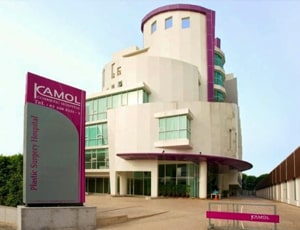
Types of Hair Transplant in Kamol Cosmetic Hospital and its associated cost
| Treatment Option | Approximate Cost Range (USD) | Approximate Cost Range (THB) |
|---|---|---|
| Hair Transplant Surgery (Overall) | 5062 - 7135 | 180476 - 254400 |
| Follicular Unit Transplantation | 5097 - 6577 | 180549 - 236041 |
| Follicular Unit Extraction | 5491 - 7087 | 196333 - 252851 |
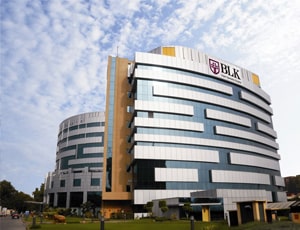
The cost for Hair Transplant ranges from USD 3900 - 4490 in BLK-Max Super Speciality Hospital
BLK-Max Super Speciality Hospital located in New Delhi, India is accredited by NABL. Also listed below are some of the most prominent infrastructural details:
DOCTORS IN 15 SPECIALITIES
FACILITIES & AMENITIES
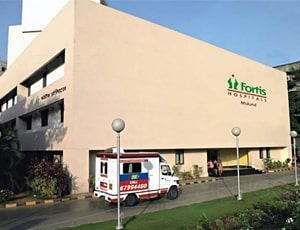
Types of Hair Transplant in Fortis Hospital, Mulund and its associated cost
| Treatment Option | Approximate Cost Range (USD) | Approximate Cost Range (INR) |
|---|---|---|
| Hair Transplant Surgery (Overall) | 2048 - 4574 | 168497 - 371346 |
| Follicular Unit Transplantation | 2028 - 3959 | 167264 - 329281 |
| Follicular Unit Extraction | 2277 - 4411 | 184444 - 376124 |
DOCTORS IN 13 SPECIALITIES
FACILITIES & AMENITIES
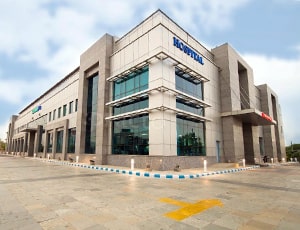
Types of Hair Transplant in Manipal Hospital, Gurugram and its associated cost
| Treatment Option | Approximate Cost Range (USD) | Approximate Cost Range (INR) |
|---|---|---|
| Hair Transplant Surgery (Overall) | 1824 - 4044 | 149636 - 332852 |
| Follicular Unit Transplantation | 1826 - 3552 | 149196 - 291098 |
| Follicular Unit Extraction | 2036 - 4075 | 166018 - 333340 |
DOCTORS IN 13 SPECIALITIES
FACILITIES & AMENITIES
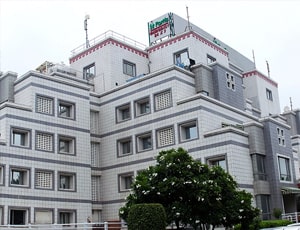
Types of Hair Transplant in Fortis Flt. Lt. Rajan Dhall Hospital and its associated cost
| Treatment Option | Approximate Cost Range (USD) | Approximate Cost Range (INR) |
|---|---|---|
| Hair Transplant Surgery (Overall) | 1827 - 4057 | 150396 - 331304 |
| Follicular Unit Transplantation | 1832 - 3569 | 150185 - 290899 |
| Follicular Unit Extraction | 2025 - 4075 | 165701 - 331384 |
DOCTORS IN 11 SPECIALITIES
FACILITIES & AMENITIES
Hair transplant treatment has gained an immense popularity in the recent few years. This cosmetic treatment has offered a new hope to people who suffer from premature falling of hair and baldness. In fact, hair transplant not only helps those who suffer from baldness but also the ones who want a new look by altering their main and hairline. Many cosmetologists around the world offer hair transplant as an effective hair loss treatment that gives long-term and satisfying results.
This hair loss treatment is best suited for people who have lost confidence because of their receding hairline and baldness. It can boost confidence in people while improving their self-image and self-worth. However, it is necessary to talk to a good cosmetic surgeon before opting for this procedure and to analyze whether you are a candidate for it or not.
This hair regrowth treatment is generally conducted in the doctor’s office. During this procedure, the hair already present on the scalp are used for transplant to the scalp area that has gone bald.
The surgeon first cleans the scalp and inject the medicine to numb the area. Depending on the approach used for transplantation, the surgeon may perform the following steps:
Follicular unit strip surgery (FUSS)
Follicular unit extraction (FUE)
Once the grafts are available, the surgeon created tiny holes in the targeted bald area and places each graft in a hole. The entire procedure takes around four to six hours to complete.Depending on the desired results and the outcomes of the procedure, another session may be conducted.
You may experience extreme tenderness and soreness in the scalp after the procedure. This is why you will be required to take pain medications for at least a few days.
Additionally, you will have a bandage over your scalp for a few days. An anti-inflammatory medication and antibiotic may be prescribed by the cosmetologist following the procedure. You will be able to return to a normal routine within two to five days of the procedure.
The transplanted hair usually fall out within a week or two of the procedure. However, the growth of new hair starts within a month of hair transplant. However, most people are able to see the growth of new hair after six to nine months.
Ask your healthcare adviser for the best multiple options and choose the one that meets your expectations
Hair Transplant Surgery is the process conducted by a dermatological surgeon involving the shifting of hair to a bald area. The hairs used for hair transplant surgery is usually taken from the back of the head. The process is completed under general anesthesia. At the start of the surgery, the surgeon cleans the scalp of the patient and injects anesthetic agent at the back of the head. In transplant surgery, the follicles are being shifted to the bald area of the head. To obtain the follicles for transplantation, two techniques are generally used. These techniques are Follicular Unit Transplantation (FUT) also known as Follicle unit strip surgery (FUSS) and Follicular unit extraction (FUE). In Follicular Unit Transplantation, a strip of tissue is taken from the back of the scalp. The back of the scalp is joined with the sutures. The surgeon cuts the tissue into different sections with the help of a surgical knife. The magnifying lens also assists the surgeon in cutting the tissue. In Follicular Unit Extraction, the follicles are directly taken from the back of the head through tiny incisions.
After the follicles are taken, the surgeon will numb the area in which the hair transplant has to be done. The area under the transplant will depend upon the required size of the transplant. The surgeon creates tiny holes in the scalp with the help of needle and scalpel and places the follicle in the hole. The total time of surgery is about 4 to 6 hours depending upon the size of the transplant.
In the context of the healthcare sector, Thailand has access to almost all types of innovation and technology. Investment is huge in the healthcare sector, both by hospitals and clinics and because of this reason, the country is attracting a huge number of medical tourists. Hair transplantation in Thailand is done through different techniques:
Follicular Unit Transplantation (FUT) or Follicle Unit Strip Surgery: FUT is the technique in which a strip of tissue containing the hairs is taken from the back of the head. The tissue is divided into various sections containing single hair or a group of few hairs. The hair follicles are then transplanted on the bald area by creating holes.
Follicle Unit Extraction: In this process, the tissue is not removed, rather only the follicles are removed from the back of the head and are translated at the required site.
Direct Hair Implantation: Direct hair transplantation is a novel technique and is a refined form of Follicle Unit Extraction. It requires the use of a patented tool for transplanting the hairs without making an incision on the scalp. Robotic hair transplantation: Robotic hair transplant surgery is fast, and safe as compared to do with hands. The patients feel less pain as the surgery is less invasive. Further, it provides high accuracy and precision to Follicular Unit Extraction technique.
Patients, after surgery, have to strictly follow guidelines from the surgeon to have fast healing and improved looks. After the surgery, either the patient may take rest at the hospital or may plan to go home. The patient should take enough rest at least 1-2 days after surgery. The patient should refrain from taking aspirin at least 2-3 days after surgery. Also, smoking should be avoided, and the patient should not take alcohol 3-5 days after surgery. Bleeding may occur on the night of surgery or after one to two days as the scalp has been exposed. Bleeding can be stopped by applying firm pressure over the area. However, the pressure should be firm but gentle as it may damage the newly transplanted follicles.
For controlling the pain and inflammation, patients may be prescribed analgesics that provides relief from pain. Development of infection may lead to complications. Thus, the patient should apply or take antibiotics as prescribed by the surgeon.
If there are sutures at the place from which tissue is obtained, they would be removed 14 days after surgery. If required, to assist the fall of crust from the scalp, appropriate medications may be applied. The medicines, either oral or topical should be used after consultation with the surgeon.
Various clinics with ultra-modern facilities and expert hair transplant surgeons are available in Thailand. These includes:
1. DHT Clinic, Bangkok, Thailand
2. Thailand Hair Transplant Center, Chiang Mai, Thailand
3. Million Hair Transplant Centre, Bangkok, Thailand
4. Absolute Hair Clinic, Bangkok, Thailand
5. Siriraj Hospital, Bangkok, Thailand
6. Bangkok Hospital, Phuket, Thailand
7. HHH Natural Hair Transplant Center, Bangkok, Thailand
1. Dr. Damkerng Pathomvanich, DHT Clinic, Bangkok, Thailand
2. Dr. Patra Pinyopawasutthi, DHT Clinic, Bangkok, Thailand
3. Dr. Suradej Pong M.D, Thailand Hair Transplant Center, Chiang Mai, Thailand
4. Dr. Thitiwat Wirarojratchakul, Million Hair Transplant Centre, Bangkok, Thailand
5. Dr. Rattapon Thuantong, Siriraj Hospital, Bangkok, Thailand
6. Dr. Kongkiat Laorwong, Absolute Hair Clinic, Bangkok, Thailand
Top cities in Thailand for hair transplant surgery include Bangkok, Phuket, and Chiang Mai.False
The hospitals in Thailand are renowned for their clinical care and personal touch they bring to every patients' well being. The several multispecialty hospitals in Thailand have made it ease for any medical tourist to make the best of choices available. The globally recognised specialists provide the best treatment to patients and this makes them reliable. Some of these multispecialty hospital groups are:
Thailand has always been considered to be a one of the top medical destinations in the world. Their doctors and surgeons are considered to be on par with the world's best medical specialists. Thai doctors are experienced and skilled in what they do. Innovation aiding medical care implementation has ensured that the quality of doctors in Thailand is unmatched. Experience in treating international patients has meant that Thai doctors are sought after from the world over.
Thailand is an attractive medical tourism destination. In addition to people coming here to holiday, Thailand provides the best of medical treatment at affordable costs. We bring to you the most popular procedures available in Thailand that encapsulate the healthcare systems:
The latest technological advancements ensure that Thailand hospitals are able to achieve success in different kinds of procedures. Whether you are a patient or a co traveller you can approach the center for International patients to get access to travel, transfer and accomodation needs. Emergency services and integrated medical suppport services are available at Thailand hospitals. There are a variety of medical facilities available in Thailand hospitals such as radiology services, operating theaters, Intensive care units, cardiac care units, diagnostic laboratory and pharmacies.
The hospitals in Thailand are renowned for their clinical care and personal touch they bring to every patients' well being. The several multispecialty hospitals in Thailand have made it ease for any medical tourist to make the best of choices available. The globally recognised specialists provide the best treatment to patients and this makes them reliable. Some of these multispecialty hospital groups are:
Thailand has always been considered to be a one of the top medical destinations in the world. Their doctors and surgeons are considered to be on par with the world's best medical specialists. Thai doctors are experienced and skilled in what they do. Innovation aiding medical care implementation has ensured that the quality of doctors in Thailand is unmatched. Experience in treating international patients has meant that Thai doctors are sought after from the world over.
Thailand is an attractive medical tourism destination. In addition to people coming here to holiday, Thailand provides the best of medical treatment at affordable costs. We bring to you the most popular procedures available in Thailand that encapsulate the healthcare systems:
The latest technological advancements ensure that Thailand hospitals are able to achieve success in different kinds of procedures. Whether you are a patient or a co traveller you can approach the center for International patients to get access to travel, transfer and accomodation needs. Emergency services and integrated medical suppport services are available at Thailand hospitals. There are a variety of medical facilities available in Thailand hospitals such as radiology services, operating theaters, Intensive care units, cardiac care units, diagnostic laboratory and pharmacies.